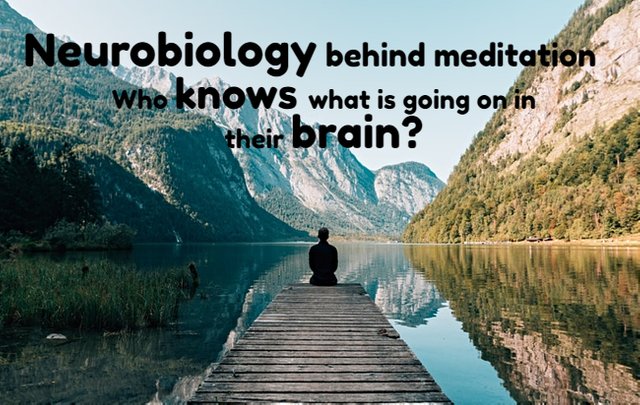Meditation has been performed for several thousand years and present in most religious practices. From east to west, from Norway to India and from America to Japan, people have a general knowledge and since science has shed some light on the benefits of meditating, it is no surprise that humming that om sound has gain popularity. What once was reserved for religion is now well explained with psychology and biology. It actually has absolutely nothing to do with religion and everything to do with your brain chemistry. The beauty of demystifying the capabilities of our bodies is extraordinary.

CC0 image, Unsplash, author: Simon Migaj, adapted
I am not trying to take away your relationship with God and if you use meditation for that purpose that is just fine because using it is what matters. I am just trying to demystify some things and explain to you how, psychologically speaking, your relationship with your self is more important and religion has nothing to do with it. There is also no secret how your hormone levels can be influenced with exercise, breathing techniques, and focus exercises. We do not know who was the first to meditate and how meditation came to be but it has been described from around 600 B.C in India so when it comes to time referencing, that is the number that is usually given to those who wonder about the origins. If you are interested in history and differences between Western vs Asiatic meditation, I suggest you read about Professor Eifring research:
From God to geometric figures from University of Oslo, Department of Culture Studies and Oriental Languages
East/West differences in meditation: Spirituality or technique from sciencedaily.com
If you are interested in the range of challenging meditation experience, a study from Brown University chronicled and categorized meditation experiences as well as the factors that influence them. You can read it here:
The varieties of contemplative experience: A mixed-methods study of meditation-related challenges in Western Buddhists by Jared R. Lindahl, Nathan E. Fisher, David J. Cooper, Rochelle K. Rosen, Willoughby B. Britton


There was a new study in 2018 with results that showed how gains in the ability to sustain attention developed through intensive meditation training are maintained up to seven years later. It was published in the Journal of Cognitive Enhancement and based on the Shamatha Project, a major investigation of the cognitive, psychological and biological effects of meditation led by researchers at the University of California, Davis, Center for Mind and Brain. The altering of the longitudinal trajectories of cognitive change across a person's life has now, for the first time, been backed by some evidence.
Influencing human cognition...
The study followed 60 experienced meditators who attended three-month meditation retreats and received ongoing instruction in meditation techniques. They attended group meditation sessions twice a day and engaged in individual practice for about six hours a day. Immediately after the study was over in the retreats, participants showed improvements in attention, general psychological well-being, and the ability to cope with stress but the interesting thing happened seven years after. 40 participants, who remained in the study, maintained cognitive gains and did not show typical patterns of age-related decline in sustained attention. There is a strong indication that lifestyles and their personalities might have played a huge role and more research is needed but this opens an interesting door into finding out just how impacted our brains can be from meditative practices, it sure is indicating that. You can read the full research here:
Cognitive Aging and Long-Term Maintenance of Attentional Improvements Following Meditation Training by Anthony P. Zanesco, Brandon G. King, Katherine A. MacLean, Clifford D. Saron


The Journal of Cognitive, Affective & Behavioral Neuroscience published a study back in 2015 about researchers from the University of Surrey discovering a link between meditation and how individuals respond to feedback. Participants varied in experience from novice and non-meditators to experienced ones. They were trained to select images associated with a reward where each pair of images had varying probabilities of a reward. They eventually learned to select the pairing with the higher outcome and those who meditated were more successful.
Learn from positive outcomes...
Those participants who meditated were more successful in selecting high-probability pairings which indicates a tendency to learn from positive outcomes. Non-meditators, on the other hand, learned the pattern via low-probability pairings suggesting a tendency to learn from the negative outcomes. They were all connected to an EEG that recorded their electrical patterns in the brain. Results found that while all three groups (non-meditators, novice ones, and experienced) responded similarly to positive feedback, the neurological response to negative feedback was highest in the non-meditation group. This indicates that the brains of meditators are less affected by negative feedback, and it just may be a result of altered dopamine levels caused by meditation. Dopamine beeing integral to how we learn and process information has previously been established from many studies on patients with Parkinson's disease who had its levels severely reduced. Dopamine levels are connected with how quickly we learn from our mistakes and our need to keep making them before we find the right answer. We may benefit from meditation to increase our productivity. Here is what the leading author of the study had to say:
"Humans have been meditating for over 2000 years, but the neural mechanisms of this practice are still relatively unknown. These findings demonstrate that, on a deep level, meditators respond to feedback in a more even-handed way than non-meditators, which may help to explain some of the psychological benefits they experience from the practice."
-Paul Knytl, lead author and PhD candidate in psychology
You can read the full study here:
Meditation experience predicts negative reinforcement learning and is associated with attenuated FRN amplitude by Paul Knytl, Bertram Opitz


Researchers from Leiden University have conducted a study that indicates how you don't need to be an experienced meditator to profit from meditation. You may get better at creative thinking even if you have never meditated before. Cognitive psychologist Lorenza Colzato and his team showed how even novices may profit from meditation and get better at conceiving new ideas but not all forms of meditation have the same effect on creativity. Participants performed better in divergent thinking after Open Monitoring meditation but that effect was not present after Focused Attention meditation.
Divergent and convergent thinking...
There is a difference between divergent and convergent thinking. With divergent thinking, you are expanding your focus. For example, I tell you the word knife and you need to think about all the possible uses for it. With convergent thinking, you are focusing on one solution or an idea. I may tell you words like swim, fish, minerals, sea and you would conclude that they all have water as the common link. While solving convergent-thinking problems, practitioners used an insight strategy, as opposed to an analytical approach, more than the novices. The study found that open-monitoring meditation induces a control state that promotes divergent thinking while the focused-attention meditation supports convergent thinking. If you are a novice who has just now discovered how there is more than one style of meditation and fell down the proverbial rabbit hole, welcome to the fun side of life. Not all meditation is the same and there are actually quite a number of different kinds but we will get to that later on. This study is available here:
Prior Meditation Practice Modulates Performance and Strategy Use in Convergent- and Divergent-Thinking Problems by Lorenza S. Colzato, Ayca Szapora, Dominique Lippelt, Bernhard Hommel
Give this one a read too:
Enhanced tactile acuity through mental states by Sebastian T. Philipp, Tobias Kalisch, Thomas Wachtler & Hubert R. Dinse


I did mention how you might have fallen through the rabbit hole and just now figured out how meditation is not a word for one specific thing. It is a general term for various kinds of practices. Mindfulness, Zen, Acem, Meditation drumming, Chakra, Buddhist, transcendental meditation, walking meditation, loving-kindness, Vipassana... I could go on but I choose not to overwhelm you. The simplest way to remember what kind of meditation exists is to remember that there are two main categories; concentrative meditation and nondirective meditation. With concentrative, you are suppressing thoughts by concentrating on breathing or a specific thing while with the nondirective ones, the mind is allowed to wander as it pleases. Your brain activity is different depending on what type of meditation you are practicing.
MRI machine to the rescue...
The Norwegian University of Science and Technology performed a study using the MRI machines to see what exactly is going on in the brains of people who are meditating. Participants took two different mental meditation activities, nondirective meditation, and a concentrative one. Nondirective meditation showed higher activity than during rest in the part of the brain dedicated to processing self-related thoughts and feelings but when the participants were performing concentrative meditation, the activity in that part of the brain was almost the same as when they were just resting and not meditating. The interesting thing is that this part of the brain has its highest activity when we rest. It is our basic operating system that takes over when external tasks do not require our attention. One of the conclusions from the co-author of the study was this:
"The study indicates that nondirective meditation allows for more room to process memories and emotions than during concentrated meditation,"
-Svend Davanger, a neuroscientist at the University of Oslo, and co-author of the study
You can read the study here:
Nondirective meditation activates default mode network and areas associated with memory retrieval and emotional processing by Jian Xu, Alexandra Vik, Inge R. Groote, Jim Lagopoulos, Are Holen, Øyvind Ellingsen, Asta K. Håberg, and Svend Davanger


Saying or even thinking how meditation is the cure for something would be wrong. Consider it a helper and a beneficiary instead. There is no danger of it, no side-effects so it does not matter if you are healthy or sick, meditating will not hurt you. Relaying on meditation alone to fix whatever is wrong with you is something I would not suggest, on the contrary, I would advise you against it. Nothing is a magical fast cure and for those of you suffering from psychological illnesses, consult your doctor before trying anything new. He or she knows your diagnoses and can recommend practices that will be most beneficial for you. Meditation has been proven as a great helper for our health. It has potential in pain reduction, enhancing brain performance and a great effect on calming people and helping them deal with stress in their every-day lives. Here is the list of studies that I have found and recommend you take a look at:
Cognitive Aging and Long-Term Maintenance of Attentional Improvements Following Meditation Training by Anthony P. Zanesco, Brandon G. King, Katherine A. MacLean, Clifford D. Saron
Arousal vs. Relaxation: A Comparison of the Neurophysiological and Cognitive Correlates of Vajrayana and Theravada Meditative Practices by Ido Amihai, Maria Kozhevnikov
Alterations in Resting-State Functional Connectivity Link Mindfulness Meditation With Reduced Interleukin-6: A Randomized Controlled Trial by J. David Creswell, Adrienne A. Taren, Emily K. Lindsay, Carol M. Greco, Peter J. Gianaros, April Fairgrieve, Anna L. Marsland, Kirk Warren Brown, Baldwin M. Way, Rhonda K. Rosen, Jennifer L. Ferris
What meditation techniques do I recomend?
I have been meditating for over 15 years and whenever someone asks me what they should do my answer is simple. Do everything and try everything. There are many different meditations and not all will be to your liking. Some you will enjoy and consider easy while others will be hard. Find those that work best for you. We are all different so do not trust people who will say to you how this or that is the best. It may be best for them. It does not mean it will be best for you. I am always poo-pooing various gurus and self-proclaimed experts when they proclaim their practice to be the only one that works. Your brain is the thing that works, meditation is just one way of using it. I do not have all the answer nor do I think that anyone has. I can only speak from my own personal experience and from everything that I have read and researched so far. There is room for a lot more. If you are interested in learning about meditation or how to meditate, I suggest you read my series of posts about meditation that I have written exclusively for this platform. I hope you will find them useful.
PART 1: Introduction to meditation and general categories
PART 2: Mindfulness meditation
PART 3: Vipassana meditation
PART 4: 3 categories of benefits
PART 5: Guided meditation
PART 6: Breathing techniques
PART 7: Grounding meditation
PART 8: Gazing meditation
PART 9: Theravada walking meditation
PART 10: Metta meditation
PART 11: Meditation for children
PART 12: Chakra meditation
PART 13: Difference between mental and emotional meditation
You are welcome to ask questions or seek advice but keep in mind that your journey is your own, not mine to take. Your brain chemistry will react to different techniques and you will find how some types of breathing exercises relax you faster than others. That is ok. Find those that work best for you and do not take anyone's words for it, not even mine. Do your research, read, learn, and discover. Take care of your psychological health and enjoy every step on the way to becoming the best you can be.
To learn more about this topic, check out these REFERENCES:

Until next time,
KEEP YOUR SMILE ON!



Image sources AND LICENCES in order of appearance:
- all images used in this post are free for commercial use, they are royalty free with the links to original images provided under them
- titles are made with the CC0 image from Pixabay that can be found here
- line divider that I use is from FREE CLIPART LIBRARY, and is here
- my bitmoji avatar was created on https://www.bitmoji.com/, visit the site to create yourown
PROUD MEMBER OF:


@steemitbloggers



























This post has been voted on by the SteemSTEM curation team and voting trail in collaboration with @utopian-io and @curie.
If you appreciate the work we are doing then consider voting all three projects for witness by selecting stem.witness, utopian-io and curie!
For additional information please join us on the SteemSTEM discord and to get to know the rest of the community!
Downvoting a post can decrease pending rewards and make it less visible. Common reasons:
Submit
Thank you very very much my kind and smart people!!! 💚💚💚
Downvoting a post can decrease pending rewards and make it less visible. Common reasons:
Submit
Probably one of the best posts about meditation I have read here let alone the internet. Very clear. One of the reasons I like it is because it appeals to my scientific rational side. It wasn't until I did vipassana that I really appreciated it's value, but that's because they do explain the effects on the brain and biochemistry rather than going into woo woo that I never quite appreciated or liked. They recommend not creatively visualising, for example, as that just gets you 'attached' to a visualisation or something you find 'beautiful' like a lily or a forest - when we should equally meditate, for example, on rotting corpses. I'm so excited about going to sit this vipassana on the 26th... yay.
Have you read/heard of any studies re: lengthening the telomeres? They suggest it actually changes the strands of your DNA. Amazing.
https://www.ncbi.nlm.nih.gov/pubmed/29518528
I'm sure you have! xx
Downvoting a post can decrease pending rewards and make it less visible. Common reasons:
Submit
I actually did not hear about it but I will most definitely read it. Thank you so much for bringing it to my attention!!! Thanks for such a kind feedback, much love 💚
Downvoting a post can decrease pending rewards and make it less visible. Common reasons:
Submit
Hhmmm.... I will never consider meditation in the same way as before... really. I always considered that as a loss of time and reading your blog made me actually thinking :)
Downvoting a post can decrease pending rewards and make it less visible. Common reasons:
Submit
Thank you for that honest feedback, it really means a lot. You are not lonely in it, however. A lot of people are still mystifying meditation when it is actually pretty simple. We have a brain, that brain works. We have hormones, those hormones impact our bodies. We know that in certain states hormone levels change and the overall brain chemistry changes. That chemistry is not the same when we are under stress or relaxed, exercising or sleeping. The brain always fascinated me, there is still soooooo much room for research and I am pretty excited what more we will find out about it. :)
Downvoting a post can decrease pending rewards and make it less visible. Common reasons:
Submit
Many people (like me) only need some articles to read about it, with scientific facts. My wife is really happy now (because I always turned out our discussions about that, considering it as loss of time. This is something we may actually try with our big boy in order to sharpen his focus (it is hard for him to concentrate in general). I will let you know whether it works.
Downvoting a post can decrease pending rewards and make it less visible. Common reasons:
Submit
This post was spotted by @theluvbug and has received a 100% upvote and/or a resteem.
If you would like to possibly receive future support from @theluvbug
then please make use of the #theluvbug tag.
Spreading the STEEMIT LOVE with upvotes and resteems of AWESOME Steemit content. Use #theluvbug to get my attention :)
In Proud Collaboration with @steemitbloggers
and their founder @jaynie
interested in joining the Steemit Bloggers Community?
Downvoting a post can decrease pending rewards and make it less visible. Common reasons:
Submit
Much love to the luv bug 💚
Downvoting a post can decrease pending rewards and make it less visible. Common reasons:
Submit
Ahh what a lovely read to open up all thought about Meditation. I was only thinking that mediation is a process of bringing calmness within , through concentrating on one particular thing. It is always good to have some meditation to bring more self conciousness
Posted using Partiko Android
Downvoting a post can decrease pending rewards and make it less visible. Common reasons:
Submit
Absolutely @steemflow and to be honest, meditation can make you unsettled too as you deal with past hurts, certain brain patterns and so on - it can be quite a challenge!! When people expect it to be JUST about being calm and it's not always, they can get quite hte shock! But better to have a way to process than quash it all down and hide it with drugs, alcohol, and Netflix. And Steemit haha
Downvoting a post can decrease pending rewards and make it less visible. Common reasons:
Submit
Thank you guys, you are absolutely lovely with your comments, much love! 💚
Downvoting a post can decrease pending rewards and make it less visible. Common reasons:
Submit
Congratulations! This post has been chosen as one of the daily Whistle Stops for The STEEM Engine!
You can see your post's place along the track here: The Daily Whistle Stops, Issue 348 (12/22/18)
Downvoting a post can decrease pending rewards and make it less visible. Common reasons:
Submit
Hi @zen-art!
Your post was upvoted by Utopian.io in cooperation with @steemstem - supporting knowledge, innovation and technological advancement on the Steem Blockchain.
Contribute to Open Source with utopian.io
Learn how to contribute on our website and join the new open source economy.
Want to chat? Join the Utopian Community on Discord https://discord.gg/h52nFrV
Downvoting a post can decrease pending rewards and make it less visible. Common reasons:
Submit
Thank you for your amazing support! 💚
Downvoting a post can decrease pending rewards and make it less visible. Common reasons:
Submit
This is a great post that's just overflowing with resources! Resteeming! I am also curious to explore it to see which of these meditation techniques align closely with shamanic and quantum meditation practices, I feel like they are both emotional as well as mental, and I'm excited to start digging! Thanks for this post, just terrific.
Xx ToL
Ps hope to see you on radio show tonight!
Downvoting a post can decrease pending rewards and make it less visible. Common reasons:
Submit
I overslept the radio show, Yule was too much for me hihi. Thanks for a lovely feedback! 💚
Downvoting a post can decrease pending rewards and make it less visible. Common reasons:
Submit
Congratulations @zen-art! You have completed the following achievement on the Steem blockchain and have been rewarded with new badge(s) :
Click here to view your Board of Honor
If you no longer want to receive notifications, reply to this comment with the word
STOPDownvoting a post can decrease pending rewards and make it less visible. Common reasons:
Submit
Congratulations! This post has been upvoted from the communal account, @minnowsupport, by zen-art 💚 from the Minnow Support Project. It's a witness project run by aggroed, ausbitbank, teamsteem, someguy123, neoxian, followbtcnews, and netuoso. The goal is to help Steemit grow by supporting Minnows. Please find us at the Peace, Abundance, and Liberty Network (PALnet) Discord Channel. It's a completely public and open space to all members of the Steemit community who voluntarily choose to be there.
If you would like to delegate to the Minnow Support Project you can do so by clicking on the following links: 50SP, 100SP, 250SP, 500SP, 1000SP, 5000SP.
Be sure to leave at least 50SP undelegated on your account.
Downvoting a post can decrease pending rewards and make it less visible. Common reasons:
Submit
wheres your actifit post?
Downvoting a post can decrease pending rewards and make it less visible. Common reasons:
Submit
I did not do it. Yesterday was a holiday for me and I was not active, resting and enjoying for the most of the day. Thank you for your worry, actifit will be today as normal :)
Downvoting a post can decrease pending rewards and make it less visible. Common reasons:
Submit
Very timely post you made here for me as I am just looking into meditation. It also looks like your post has been well received by the steemit community as a whole so congratulations on a job well done.
Downvoting a post can decrease pending rewards and make it less visible. Common reasons:
Submit
Thank you honey. I was skeptical about how the post will be received but I guess I made a certain reputation and believe that people read the post because I was the one who wrote it. I am not sure they would have read it if I have written in a couple of months ago :D I am very happy now, very very happy
Downvoting a post can decrease pending rewards and make it less visible. Common reasons:
Submit
Wow, this is a fabulous post! You did a wonderful job of constructing this piece. The information held herein is truly valuable!
I've never been able to put a good definition to the convergent/divergent thought, but I have used them and taught them in my own words for years - great to have a better definition, heh.
All of the research going on with these practices is absolutely wonderful. The study you mentioned about choosing higher reward probabilities definitely stood out to me. Quite interesting!
Downvoting a post can decrease pending rewards and make it less visible. Common reasons:
Submit
I am happy you found it interesting, thanks so much for that wonderful feedback! 💚
Downvoting a post can decrease pending rewards and make it less visible. Common reasons:
Submit
I've tried meditation before but it was so hard for me to concentrate. Til this day, I'm still wondered how people could do it for hours.
Downvoting a post can decrease pending rewards and make it less visible. Common reasons:
Submit
LOL, not all people do it for hours so do not have too big expectations. Meditating for 5 or 10 minutes is absolutely fine :)
Downvoting a post can decrease pending rewards and make it less visible. Common reasons:
Submit
Maybe I will try again later. One time, I tried meditation but fell asleep and woke up 20 minutes later.
Downvoting a post can decrease pending rewards and make it less visible. Common reasons:
Submit
The main goal of meditation is to relax you. If you feel asleep it is pretty safe to say that it worked ;)
Downvoting a post can decrease pending rewards and make it less visible. Common reasons:
Submit
Hahaha. That's true.
Downvoting a post can decrease pending rewards and make it less visible. Common reasons:
Submit
Most intelligent work on the content you present here, @zen-art!
Hey, @pendeis :-) Looking for a profound read?
Downvoting a post can decrease pending rewards and make it less visible. Common reasons:
Submit
Thank you honey, you are very kind 💚
Downvoting a post can decrease pending rewards and make it less visible. Common reasons:
Submit
Very interesting the bit about dopamine increases through meditation, I will definitely try it out now!
Downvoting a post can decrease pending rewards and make it less visible. Common reasons:
Submit
I always enjoy the amount of research you put into your posts and the different views you present. I had never really seen much on the differences between non-directive and concentrative. I think when I first tried meditation I was under the impression it was all about just being totally still and banishing all thoughts. Once I explored it more and found some different approaches I realize I tend to be more inclined to stick with a more non-directive approach better and enjoy it much more. I was doing pretty well about being fairly consistent in my practice, but fell of the wagon a little while ago. I definitely need to jump back on the bandwagon! It's great to see the science behind the benefits, and I know for certain I felt a positive impact in my own life when I was more consistent.
Downvoting a post can decrease pending rewards and make it less visible. Common reasons:
Submit
Wow! I've been doing it for maybe 2 years, but just 10 min a day! The concentrative kind, though your post now makes me think maybe I should switch to non-directive. I've tried just attending to whatever sounds happen around, from birds chirping to cars engines revving, and it's much more calming than forcing myself to attend to my breath, which gets boring and irritating.
Downvoting a post can decrease pending rewards and make it less visible. Common reasons:
Submit
You should definitely try out more different things just to see what else is available. Meditating 10 minutes a day is awesome! If you have that as a habit, you are doing great! 💚
Downvoting a post can decrease pending rewards and make it less visible. Common reasons:
Submit